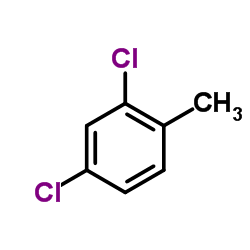2,4-Dichlorotoluene

2,4-Dichlorotoluene structure
|
Common Name | 2,4-Dichlorotoluene | ||
|---|---|---|---|---|
| CAS Number | 95-73-8 | Molecular Weight | 161.029 | |
| Density | 1.2±0.1 g/cm3 | Boiling Point | 198.6±20.0 °C at 760 mmHg | |
| Molecular Formula | C7H6Cl2 | Melting Point | -14 °C | |
| MSDS | Chinese USA | Flash Point | 79.4±0.0 °C | |
|
Metabolism of dichloromethylcatechols as central intermediates in the degradation of dichlorotoluenes by Ralstonia sp. strain PS12.
J. Bacteriol. 184(19) , 5261-74, (2002) Ralstonia sp. strain PS12 is able to use 2,4-, 2,5-, and 3,4-dichlorotoluene as growth substrates. Dichloromethylcatechols are central intermediates that are formed by TecA tetrachlorobenzene dioxygenase-mediated activation at two adjacent unsubstituted carbo... |
|
|
Development of a solid-phase microextraction-gas chromatography-tandem mass spectrometry method for the analysis of chlorinated toluenes in environmental waters.
J. Chromatogr. A. 1216(14) , 2816-24, (2009) In the present work, a simple and fast methodology has been developed for the analysis of chlorotoluenes in water samples using solid-phase microextraction (SPME) coupled to gas chromatography-tandem mass spectrometry (GC/MS/MS). A multifactorial experimental... |
|
|
Rapid and selective catalytic oxidation of secondary alcohols at room temperature by using (N-heterocyclic carbene)-ni(0) systems.
Chemistry 16(23) , 6857-60, (2010) The selective, anaerobic catalytic oxidation of secondary alcohols at room temperature by using an in situ (N-heterocyclic carbene)-Ni(0) system is presented. The use of non-anhydrous, non-degassed 2,4-dichlorotoluene as both the oxidant and the solvent allow... |
|
|
[Gas chromatographic determination of 2,4-dichlorotoluene in water].
Gig. Sanit. (3) , 44-5, (1988)
|
|
|
[Hygienic standards for 2,4-dichlorotoluene in reservoir water].
Gig. Sanit. (2) , 80-1, (1988)
|
|
|
Measurement and theory of hydrogen bonding contribution to isosteric DNA base pairs.
J. Am. Chem. Soc. 134(6) , 3154-63, (2012) We address the recent debate surrounding the ability of 2,4-difluorotoluene (F), a low-polarity mimic of thymine (T), to form a hydrogen-bonded complex with adenine in DNA. The hydrogen bonding ability of F has been characterized as small to zero in various e... |
|
|
α-Bromo-2,6-dichlorotoluene: molecular structure, vibrational spectroscopy, natural bond orbital analysis and NMR studies.
Spectrochim. Acta. A. Mol. Biomol. Spectrosc. 95 , 64-72, (2012) The FT-IR and FT-Raman spectra of α-bromo-2,6-dichlorotoluene (αBDCT) have been recorded. The structural and spectroscopic data of the molecule in the ground state have been calculated using Hartree Fock (HF) and Density Functional Theory (DFT)/B3LYP with the... |